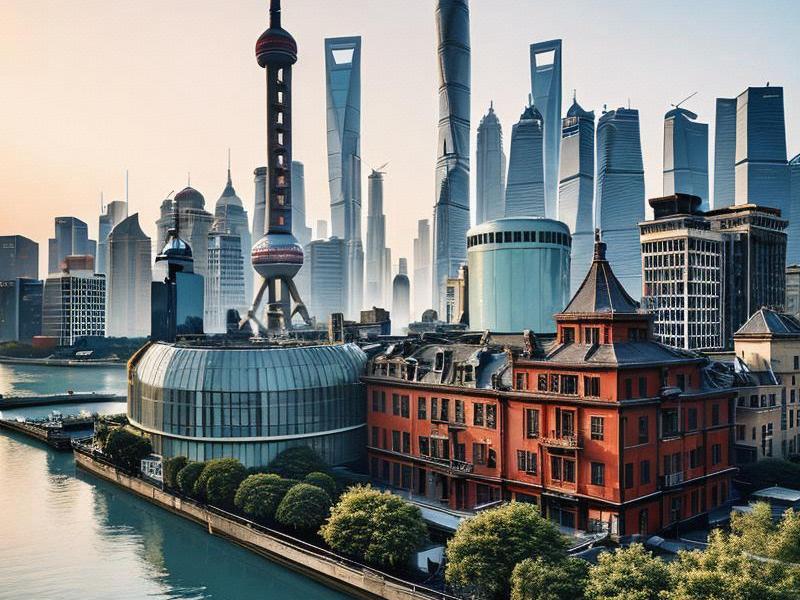This article delves into the ongoing cultural and technological renaissance in Shanghai, exploring how the city is balancing its rich historical heritage with cutting-edge advancements. It examines the transformation of Shanghai from a traditional port city to a global hub for culture, technology, and finance.

Shanghai, often referred to as the "Pearl of the Orient," has long been a symbol of China's economic prowess and cosmopolitanism. Over the past few decades, the city has undergone a remarkable transformation, blending its historical charm with modern innovation. This renaissance is not just about skyscrapers and financial districts; it's a comprehensive revival that encompasses culture, technology, and urban development.
Historical Legacy and Modern Identity
Shanghai's history dates back to the 11th century, but it was in the 19th century that the city emerged as a major international port. The Bund, with its colonial-era architecture, stands as a testament to this era. However, the city's identity has evolved significantly since then.
In recent years, Shanghai has been actively preserving its historical landmarks while embracing modernity. The Bund has been revitalized with new developments like the Shanghai Tower, the tallest building in China and the second-tallest in the world. This juxtaposition of old and new is a hallmark of Shanghai's renaissance.
Cultural Revival
One of the most striking aspects of Shanghai's renaissance is its cultural revival. The city has become a vibrant hub for arts, music, and literature. The Shanghai International Film Festival, one of the oldest and most prestigious film festivals in Asia, attracts filmmakers and audiences from around the globe.
The city's museums and galleries are also thriving. The Shanghai Museum, renowned for its extensive collection of Chinese art, has become a must-visit destination. Similarly, the Power Station of Art, a former power plant turned contemporary art museum, showcases cutting-edge exhibitions.
上海品茶论坛 Cultural districts like Tianzifang and Xintiandi have transformed old industrial areas into lively spaces filled with boutique shops, cafes, and restaurants. These neighborhoods not only preserve the city's industrial heritage but also provide a platform for local artists and entrepreneurs.
Technological Innovation
Shanghai is at the forefront of China's technological revolution. The city is home to several high-tech zones, including Zhangjiang Hi-Tech Park and漕河泾开发区 (Chuancheng Development Zone). These areas have attracted numerous multinational corporations and startups, making Shanghai a global center for innovation.
The city's government has been proactive in fostering a supportive environment for technology companies. Initiatives like the Shanghai Free-Trade Zone have streamlined regulations and encouraged foreign investment. This has led to the establishment of research institutions, incubators, and accelerators that nurture technological advancements.
Artificial intelligence, big data, and biotechnology are some of the key sectors driving Shanghai's technological growth. Companies like ByteDance, better known as TikTok, have chosen Shanghai as their headquarters, further cementing the city's status as a tech hub.
Urban Development and Sustainability
Shanghai's urban development is characterized by a commitment to sustainability and livability. The city has implemented various green initiatives to reduce its carbon footprint and improve environmental quality. The Huangpu River, once heavily polluted, has undergone significant cleanup efforts, making it a popular spot for residents and tourists alike.
上海品茶论坛
Public transportation in Shanghai is another area of success. The city boasts one of the most extensive metro systems in the world, providing efficient and affordable travel options. Additionally, Shanghai is investing in electric vehicles and smart infrastructure to promote sustainable mobility.
The city's skyline is a testament to its urban planning achievements. Iconic landmarks like the Oriental Pearl Tower, the Jin Mao Tower, and the Shanghai Tower are not only architectural marvels but also symbols of the city's aspirations.
Economic Transformation
Shanghai's economic transformation has been nothing short of extraordinary. Once a hub for manufacturing, the city has successfully transitioned to a service-oriented economy. Finance, trade, and technology are now the pillars of Shanghai's economy.
The Shanghai Stock Exchange is one of the largest in the world, attracting investors from across the globe. The city's free-trade zones have facilitated international trade and investment, making Shanghai a key player in the global economy.
Tourism is another significant contributor to Shanghai's economy. The city's blend of historical sites, cultural attractions, and modern amenities makes it a top destination for travelers. Events like the Shanghai International Fashion Week and the Shanghai Expo have further enhanced the city's reputation as a global city.
上海龙凤419 Challenges and Opportunities
Despite its many achievements, Shanghai faces several challenges. Rapid urbanization has led to issues like housing shortages, traffic congestion, and environmental concerns. The city is working to address these challenges through innovative solutions and sustainable practices.
One of the key opportunities for Shanghai lies in its ability to attract and retain talent. The city's cosmopolitan environment, high standard of living, and access to cutting-edge technology make it an attractive destination for professionals from around the world.
Shanghai's renaissance is not just about economic growth; it's about creating a livable, sustainable, and culturally rich city. By balancing its historical heritage with modern innovation, Shanghai is setting a new standard for urban development.
Conclusion
Shanghai's journey through cultural and technological revival is a story of resilience, adaptability, and ambition. The city's ability to preserve its historical legacy while embracing modernity is a testament to its unique character. As Shanghai continues to evolve, it remains a beacon of hope and inspiration for cities around the world.
In the coming years, Shanghai is poised to play an even more significant role on the global stage. Whether it's through advancements in technology, cultural exchanges, or sustainable urban development, the city's renaissance is far from over. Shanghai's story is one of continuous growth and transformation, a reminder that the future is always within reach.